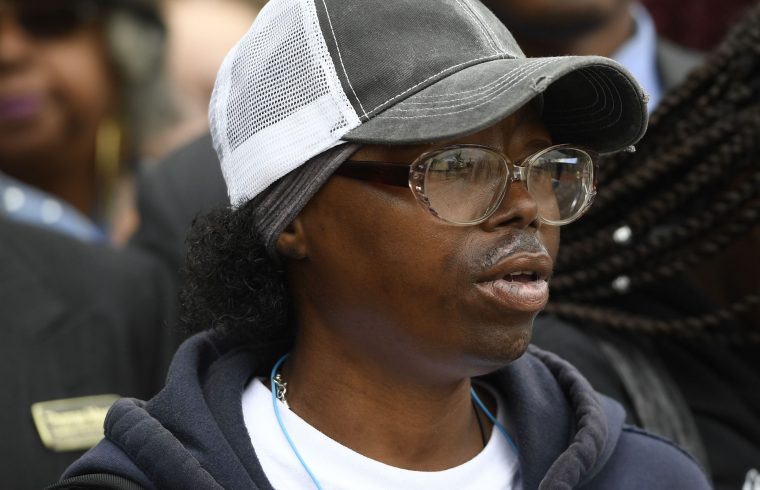Elijah McClain was walking home from the convenience store carrying a bottle of iced tea last August when three police officers tackled him to the ground. The 23-year-old massage therapist from Aurora, Colorado—described as “nothing but positive” by his cousin, “sweet” by his sister, and “an introvert who sought peace in his life” by his mother—was put in a stranglehold by the cops and injected with ketamine. He died six days later.
His family is now suing the Aurora police officers and paramedics involved in his death, seeking accountability “for the profound loss of a beautiful soul, and to ensure that Elijah did not die in vain by sending a resounding message that racism and brutality have no place in American law enforcement,” according to The Denver Post.
This content is imported from Instagram. You may be able to find the same content in another format, or you may be able to find more information, at their web site.
The Aurora Police Department officers who confronted McClain—Nathan Woodyard, Jason Rosenblatt, and Randy Roedema—reportedly used a “carotid pressure hold,” to restrain him, a controversial method “designed to immobilize a suspect by blocking the neck artery and, by extension, the flow of blood to the brain,” according to NBC News.
The lawsuit filed by McClain’s family names all three officers as defendants, as well as 10 other officers, a paramedic, the doctor in charge of Aurora Fire Rescue’s ketamine program, and the city of Aurora, according to The Denver Post.
“We have filed this civil rights lawsuit to demand justice for Elijah McClain, to hold accountable the Aurora officials, police officers, and paramedics responsible for his murder, and to force the City of Aurora to change its longstanding pattern of brutal and racist policing,” his family said in a statement to CBS News.
This content is imported from YouTube. You may be able to find the same content in another format, or you may be able to find more information, at their web site.
In bodycam footage posted to YouTube by the Aurora Police Department, one of the officers involved accuses McClain of reaching for his gun. McClain tells the officers he is unarmed, and just trying to get home.
These were some of his last words:
“I can’t breathe. I have my ID right here… My name is Elijah McClain. That’s my house. I was just going home. I’m an introvert. I’m just different. That’s all. I’m so sorry. I have no gun. I don’t do that stuff. I don’t do any fighting. Why are you attacking me? I don’t even kill flies. I don’t eat meat. But I don’t judge people, I don’t judge people who do eat meat. Forgive me. All I was trying to do was become better… I will do it… I will do anything. Sacrifice my identity, I’ll do it. I’ll do it. You all are phenomenal. You are beautiful and I love you. Try to forgive me. I’m a mood Gemini. I’m sorry. I’m so sorry. Ow, that really hurt. You are all very strong. Teamwork makes the dream work.”
In the video, McClain can be heard sobbing, vomiting, and then saying: “Oh, I’m sorry I wasn’t trying to do that. I just can’t breathe correctly.”
One of officers threatened to bring a police dog over to him and bite him for “messing around.”
In a statement to ELLE.com, Mari Newman, an attorney for McClain’s family, called the Aurora Police’s treatment of McClain “sadistic, brutalizing and terrorizing.”
His father, LaWayne Mosley, released a statement to ELLE.com through Newman: “Police officers are supposed to serve and protect,” he said. “My son never hurt a soul in his life, but they murdered him for no reason.”
His mother, Sheneen McClain, said this via Newman: “I miss him every day. He brought joy to everyone who met him. The world is a darker place without him.”
An Aurora Fire Rescue medic administered McClain 500 milligrams of ketamine in an effort to sedate him, District Attorney Dave Young said in a letter to Aurora Police Chief Nick Metz obtained by The Sentinel Colorado. In July, the Colorado Department of Public Health and Environment reopened an investigation into the use of ketamine following McClain’s death, according to CBS Denver. The CDPH received a lot of “new information about how the sedative was given,” according to CBS Denver, and has “now launched a new complaint investigation. The new information and complaints were starting to be received in June of this year.”
McClain reportedly went into cardiac arrest on the way to the hospital and was taken off of life support after he was declared brain dead.
This content is imported from Instagram. You may be able to find the same content in another format, or you may be able to find more information, at their web site.
In a coroner’s report obtained by The Sentinel Colorado, Forensic Pathology Consultant Dr. Stephen Cina wrote that he was unable to determine McClain’s cause of death. Cina said that “the manner of death may be accident if it was an idiosyncratic drug reaction. It may be natural if [McClain] had an undiagnosed mental illness that led to excited delirium, if his intense physical exertion combined with a narrow coronary artery led to an arrhythmia, if he had an asthma attack, or if he aspirated vomit while restrained.”
Cina also wrote that McClain’s death “may be a homicide if the actions of officers led to his death (e.g. carotid control hold led to stimulation of the carotid sinus resulting in an arrhythmia).”
The officers who detained McClain were initially placed on administrative leave, but have all since been reinstated. The city of Aurora has since banned the controversial carotid hold and, according to The New York Times, “jettisoned an outside investigator—who had been hired to look into the killing—because he was a former police officer.”
Colorado Gov. Jared Polis has also appointed a special prosecutor to “determine whether the facts justify criminal charges against members of law enforcement” involved in the arrest.
“Elijah McClain should be alive today, and we owe it to his family to take this step and elevate the pursuit of justice in his name to a statewide concern,” Polis said in a statement posted to Twitter. “Now more than ever, we must do something within our power to foster public trust and confidence in law enforcement and the criminal justice system.”
This content is imported from Twitter. You may be able to find the same content in another format, or you may be able to find more information, at their web site.
McClain’s case is receiving renewed attention on social media with the hashtag #JusticeForElijahMcClain since the police killing of George Floyd in May convulsed the country, sparking fresh scrutiny of old cases involving police brutality.
More than 5 million people have now signed this petition demanding all officers involved in McClain’s death to be taken off duty.
This content is created and maintained by a third party, and imported onto this page to help users provide their email addresses. You may be able to find more information about this and similar content at piano.io
This commenting section is created and maintained by a third party, and imported onto this page. You may be able to find more information on their web site.














